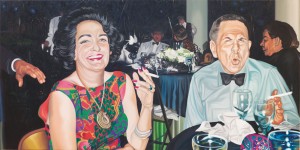DN: There is an intimacy to the act of painting people, especially people that you know. Do you feel a deeper connection to the people that you paint?

NL: I think that in the painting it’s an essence that comes through when I know the person. Not always, but it is the essence that I see or feel, not what they feel about themselves. A woman last night came in, and I said, “Hey! You made it to the wall. You made the cut!” And she said, “You showed me with my mouth open? What would you do that for?” And I said, “What?! Are you kidding me! That’s fabulous!”
DN: I’m sure that happens all the time.
NL: All the time.
DN: I wonder if performance art comes into play with your alter egos that you sometimes adopt for parties. Artists have to be performers sometimes. You are performing at an opening, or you are performing a brand. How do you navigate your private life and your public life and then your hyper-real performative personae?
NL: The reason that I will keep doing that is because I don’t feel like I have a private life anymore. And besides, doesn’t everybody want to be an actor? Look at those movie stars. Everybody wants to be somebody else. Even when somebody wants me to paint them, they want to be somebody else.
Those characters came from doing shows with Gary Leatherman when I used to do ceramics. He is a hairdresser. I call him my stylist. We used to try to make me look like my pieces that I was doing just for the fun of it. Life can be a little boring sometimes, and you have to spice it up.
DN: I loved what you said in a recent article about your husband Bob Powell [who died in 2013] and the support that he showed you.
NL: You know who else does that? Vernon Fisher. And I told him one time because I see how he treats [his wife] Julie Bozzi, and I know how generous he is to her in supporting her career, and she, of course, is fabulous in her own right. That’s what a marriage should be, to be there and support one another, and that’s what Bob was. I always told my mother that I would get married either when I was 40 or 60, just because I wanted to experience that. But I got so lucky. He was so easy to live with, to be with. He always told me that he was proud to be with me.
DN: He was lucky too.
NL: I don’t know about that. But I was really, really lucky.
DN: Artspace 111 is a strong center for representational painting, and you have played a large role in that.
NL: Because of [brothers Daniel and Dennis Blagg].
DN: But you are a major player, and I didn’t want to name any names because I’m at risk of leaving people out, but this is a distinctive place in North Texas for some top-notch painters. You have been very influential in that just as Dennis and Dan have. How do you perceive of your influence on other artists? Where do you see it? Maybe that applies to me, too, because there are a lot of ways you have influenced me.
NL: Really?
DN: In terms of what I’m working on now, yes. Your paintings like “Governor’s Trio” and “Holiday Dogs.” And not just for the shifting perspectives but for the patterning and flatness.












This is a great interview. Thank you both for sharing.
Awesome.
Incredible interview. Incredible woman. Incredible art.